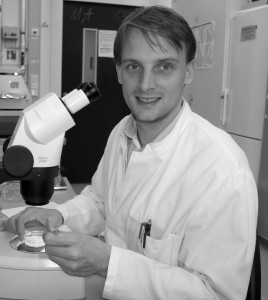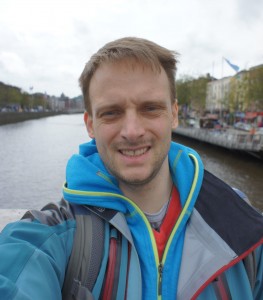Science For Six-Year-Olds (SFSYO for this school year) is a recurring segment on Science Decoded for Mrs. Podolak’s first grade class at Lincoln-Hubbard elementary school. This year the posts are inspired by #iamscience (also a Tumblr) and #realwomenofscience two hashtags on twitter that drove home for me the importance of teaching people who scientists are and what they really do.
Hello first graders! I hope you are all okay and back at school after hurricane Sandy. Now that it is November we have a new scientist of the month. I am so excited to introduce you to Philipp Schiffer who is finishing up his PhD at school in Cologne, Germany. Like I did with Dr. Penny, I asked Philipp a bunch of questions to find out more about what he does. I hope you will enjoy learning more about him. Below you can read my interview with Philipp, and if you’d like to ask him any questions, be sure to leave them in the comments!
***
Erin: What type of scientist are you?
Philipp: I’m an evolutionary biologist [this means he studies genetics, DNA, and how different living things came to be,] currently I’ve morphed into a computer geek but I’m hoping to move away from the computer screen a bit more in the future.
Erin: What did you study in school, and where did you go?
Philipp: I studied Biology, majoring in Zoology with minors in Genetics and Palaeontology. I did most of my studies at the University of Cologne, Germany with some time in Australia studying and catching wombats. I’m currently finishing my PhD thesis in Cologne, but I’ve also studied at the University of California Riverside where I was learning about nematodes. I also got to spend some time in Edinburgh in Scotland.
Erin: Where do you work and what does a typical day at work entail?
Philipp: It’s called the Cologne Biocenter, in the middle of Köln am Rhein. At the moment I am spending most of my working hours in front of my computer, doing science in-silico, which means I am analyzing data from the genome sequencing assays I conduct. In between I hop over to the lab to study the nematodes, look at their DNA or run some other experiments.
Philipp: There is a new and intriguing question to answer every day, more than one on most days. That is the main thing, I am really interested in answering questions about life – why it is the way it is and how did it become like that? Why are species different and how does it happen. There is a woo hoo! moment when things finally click into place and make sense, which is really cool. It is also really nice to work with people around the world – I like the exchange of thoughts and ideas in different cultures. I enjoy talking to colleagues very much, and working with students. It is also fun to be able to listen to music when working, and so much more.


From the first graders: How old are you? Why did you decide to study nematodes? What have you learned from studying them so far? Why have you gone to schools in so many different places? Thank you for the post!
Hey kids, thanks for your questions. Here are my answers:
1. I am 32, actually became 32 last week.
2. Why did I decide to study nematodes. Just by chance! I was studying goose barnacles and then started to look for a place to do my PhD. I found/met my current boss and he was working with nematodes and they proofed to be the ideal organisms to work with on the the questions I was/am interested in.
3. What have I learned so far, oh, that is a hard one: I think I have learnt that although nematodes all look just like tiny, tiny (and maybe boring) worms at first, they are totally different in many, many ways – which makes them very exciting animals to study. And also: nematodes just own our planet – they are simply everywhere, so forget about bugs and flies, it is the worms that are important. 😉
4. Why have I gone to school in so many places? Well, I think it is very important to get to know the world and I really like to meet new people from all over the world, thus I tried to get around a bit during my studies.
My sister just explained to me, that it should read ‘turned 32’ instead of ‘became 32’….